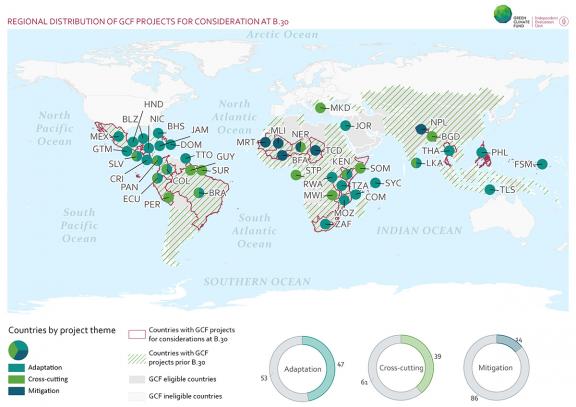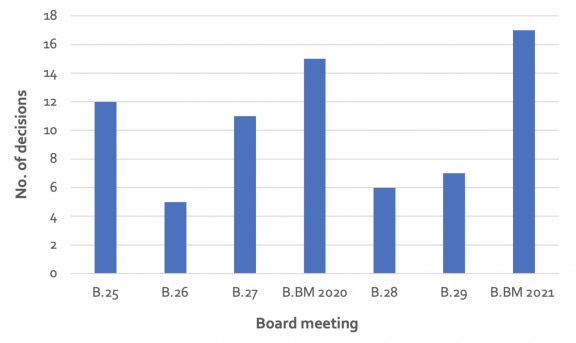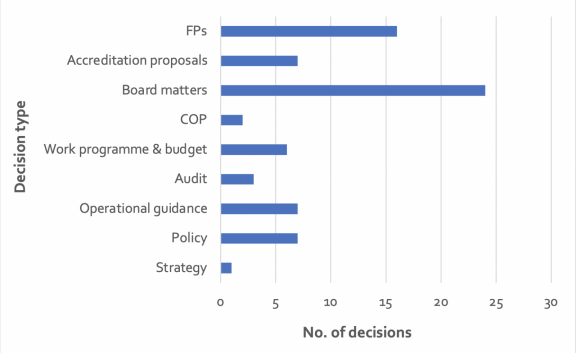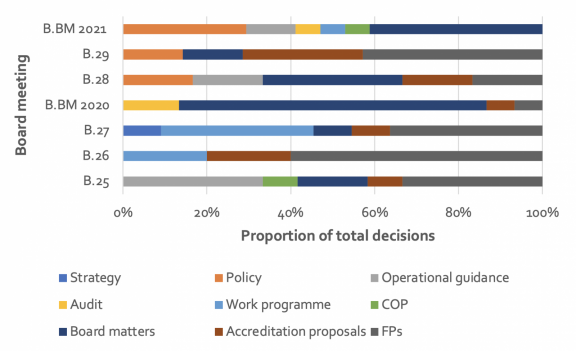A sneak peek at GCF’s B.30: Funding proposals, and strategy and policy items for Board discussion
The thirtieth meeting of the GCF Board is being held virtually from 4 to 7 October 2021. Thirteen projects have been presented for consideration by the Board at B.30, with requested GCF funding totalling USD 1.2 billion.
This blog will first provide an overview of the projects being presented for the Board’s consideration at B.30 and what their approval might mean for the overall GCF portfolio. These proposals are diverse in terms of both the access modalities used and the thematic areas being targeted. Also, with B.30 expected to bring forward discussions around several important policy items, as per the B.30 provisional agenda, this blog will touch upon these policy and strategy items, namely: Matters related to the Simplified Approval Process (SAP), the Review of the capabilities of the GCF to deliver increased programming and implementation over 2020-2023, and Steps to enhance the climate rationale of project and programme proposals. If approved, these policy/strategy items promise to have a material impact on the GCF project cycle going forward. Also, intrigued by the fact that some Board meetings include more policy/strategy related items than others, this blog presents a brief analysis of the Board’s activities and decisions over the GCF-1 programming period (2020-2023) and will share some interesting findings from the analysis here. So, keep reading!
Overview of the 13 projects for Board consideration at B.30
All thirteen funding proposals seeking Board approval at B.30 have come through the regular Project Approval Process (PAP). If approved, they will bring the GCF’s total portfolio to 190 projects and programmes, representing a total GCF funding amount of approximately USD 10 billion.
The B.30 funding proposals represent considerable geographic diversity (Figure 1, below). If all thirteen proposals are approved, an additional USD 413.2 million of GCF finance will flow to countries in Africa, USD 149.2 million to the Asia-Pacific, USD 626.8 million to Latin America and the Caribbean, and USD 17.4 million to Eastern Europe. 51 per cent of requested funding targets the least developed countries (LDCs), small island developing States (SIDS) and/or African States. Moreover, six of the projects are from direct access entities (DAEs), representing 30 per cent of the total requested funding amount in nominal terms. Even if all proposals are approved, however, this will still mean that only 20 per cent of overall GCF funding is flowing to DAEs in nominal terms.
A particularly promising feature of the funding proposals being brought forward at B.30 is the high number of adaptation projects. Eight of the thirteen proposals are for adaptation projects, while there are three cross-cutting and two mitigation projects. In nominal terms, USD 766.6 million, or 63 per cent of the total funding requested, is for adaptation projects (including adaptation components of cross-cutting proposals). Given that GCF investments have tended to prioritise mitigation projects, the high number of adaptation proposals being presented at B.30 is a welcome development. Three of the adaptation proposals, moreover, are from private sector entities (representing three out of the four private sector funding proposals seeking approval at B.30). This is significant: a recent IEU learning paper analysed, for example, the potential of the current GCF portfolio to contribute to transformational change and found that adaptation projects have the highest transformative potential. The paper also suggested that private sector-funded adaptation projects have a substantial role to play in catalysing high-impact, transformative climate projects (Puri, Prowse, De Roy & Huang 2021).
The strong focus on adaptation in the B.30 funding proposals is also important in the context of the recently released first instalment of the Sixth Assessment Report of the Intergovernmental Panel on Climate Change (IPCC). The report highlights that human-induced climate change is already affecting every region on Earth, with observable shifts in the severity and frequency of extreme weather events such as heatwaves, heavy precipitation, droughts, and tropical cyclones. These findings only reinforce the need for the GCF to continue to increase its investments in adaptation – a topic that promises to be a key feature of discussions at the upcoming COP26 climate conference in Glasgow in November.
Figure 1 – Regional distribution of GCF projects for consideration at B.30
Source: IEU DataLab. Analysis done by Laurene Torterat.
Policy and strategy items for consideration at B.30
Several strategy and policy items also appear on the B.30 provisional agenda (see Table 1). The approval of a number of these items would have a clear impact on the project cycle and GCF’s portfolio going forward, and for this reason, they are presented here. Moreover, with the GCF approximately halfway through its current programming period, the findings of an IEU analysis of Board decision-making in GCF-1 are used to help contextualise the upcoming B.30 policy discussions. We note, of course, that the ongoing COVID-19 pandemic has forced the Board to continue meeting virtually over this period (with the exception of B.25), which potentially impacts many of both formal and informal aspects of its regular decision-making processes.
Table 1 – Policy and strategy items on the B.30 provisional agenda
| B.30 item | Description |
|---|---|
|
Matters related to the simplified approval process (SAP) |
The Secretariat has submitted a set of options to update the SAP, including the following:
Accelerate the consideration and approval of SAP funding proposals through the introduction of a specific procedure for approvals with a Board meeting on a non-objection basis |
|
Review of the capabilities of the GCF to deliver increased programming and implementation over 2020-2023 in line with the USP |
This item was initially presented to the Board at B.29 but was not opened at that time. Building on the review (conducted by an external firm, Dalberg Global Development Advisors), document GCF/B.30/08 recommends that the Secretariat pursue ongoing efficiency measures and that the Board consider:
|
|
Steps to enhance climate rationale |
Document GCF/B.30/04 sets out non-prescriptive, principles-based guidance that accredited entities can use to establish the climate impact potential of GCF-supported projects and programmes in line with the GCF investment framework. The document outlines actions that are being taken by the Secretariat and the independent Technical Advisory Panel (iTAP) to establish clear and consistent guidance and support for the assessment of the climate impact potential of proposals. |
These policy and strategy items are sure to attract considerable attention from Board members at B.30. As the following analysis indicates, however, policy and strategy decisions have comprised only a minor overall share of Board decisions made since the start of 2020.
A total of 73 Board decisions have been made so far during GCF-1 (excluding B.30). 41 of these decisions were made during Board meetings – an average of 8.2 decisions per meeting. In addition, 32 decisions have been made as between Board meeting decisions (BBMs), including 15 in 2020 and 17 so far in 2021 (see Figure 2 below). BBMs have thus comprised 44 per cent of the total number of decisions made in GCF-1 to date.
Figure 2 – Total number of decisions per GCF Board meeting
Source: IEU DataLab. Analysis done by the author.
As part of the analysis, we also sought to examine the nature of the decisions being taken by the Board. Through an inductive approach, we arranged the Board’s decisions into nine categories: strategy, policy, operational guidance, audit, work programmes, COP related, Board matters, accreditation proposals and FPs. The number of Board decisions taken in GCF-1 to date is shown below in Figure 3, broken down into these nine categories.
Figure 3 – Total number of decisions by type
Source: IEU DataLab. Analysis done by the author.
So far in GCF-1, a limited number of strategy and policy decisions have been taken by the Board. The Board has made one strategy decision (B.27/06) and seven policy decisions since the start of 2020, five of which were BBMs in 2021. The majority of decisions made in GCF-1 to date (24 out of 73) relate to Board matters and Board meetings (including procedural items such as the opening of meetings, as well as more substantive matters such as committee appointments). The second-highest category of decisions is “Funding Proposals (FPs)”, with sixteen such decisions made since the start of 2020. As suggested above, it is possible that the virtual setting of Board meetings during the pandemic has seen the Board place more focus on non-policy and non-strategy matters given that policy and strategy items often require extensive deliberation and discussion. Indeed, policy and strategy decisions have together comprised only 11 per cent of total Board decisions in GCF-1.
The analysis also indicates that decisions on policy matters have not been made consistently: no policy decisions were made in 2020, while B.28 and B.29 saw one policy decision each. The remaining five were handed down as BBMs in 2021. The breakdown of decision type as a proportion of total decisions per Board meeting is presented in Figure 4 below. With a relatively high number of strategy and policy items on the B.30 provisional agenda, it is certainly possible that such decision types will take up a greater share of overall decisions compared to recent Board meetings.
Figure 4 – Proportion of total decisions per Board meeting by decision type
Source: IEU DataLab. Analysis done by the author.
B.30 promises to be an eventful Board meeting, given the diverse range of funding proposals (representing USD 1.2 billion in requested finance) seeking approval, and the important strategy and policy items up for discussion. We hope that developments at B.30 help provide a positive platform for the upcoming negotiations at COP26.
References
Green Climate Fund (2021). GCF/B.30/02: Consideration of funding proposals.
Green Climate Fund (2021). GCF/B.30/04: Steps to enhance the climate rationale of GCF-supported activities.
Green Climate Fund (2021). GCF/B.30/06: Update of the simplified approval process.
Green Climate Fund (2021). GCF/B.30/08: Review of Secretariat capabilities to deliver the updated Strategic Plan for 2020 – 2023.
IPCC (2021). Climate Change 2021: The Physical Science Basis. Contribution of Working Group I to the Sixth Assessment Report of the Intergovernmental Panel on Climate Change.
Puri, Jyotsna, Martin Prowse, Emma De Roy and David Huang (2021). Assessing the likelihood for transformational change at the Green Climate Fund. IEU learning paper, No. 05, March 2021. Independent Evaluation Unit, Green Climate Fund. Songdo, South Korea.
Disclaimer: The views expressed in blogs are the author's own and do not necessarily reflect the views of the Independent Evaluation Unit of the Green Climate Fund.
